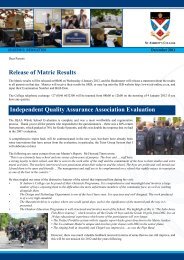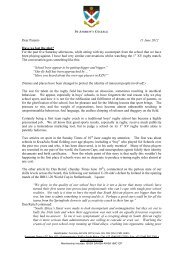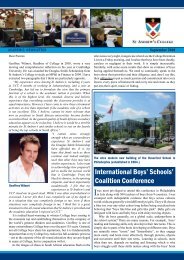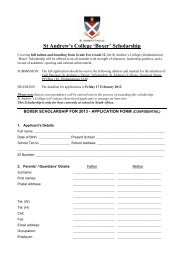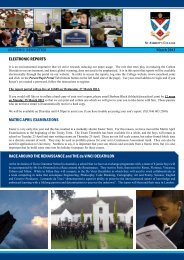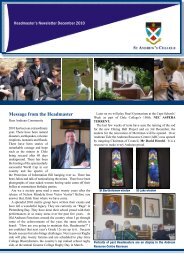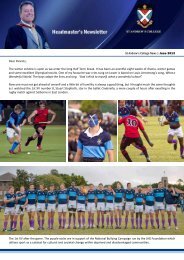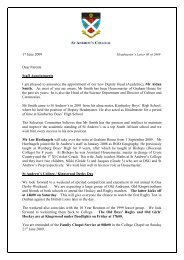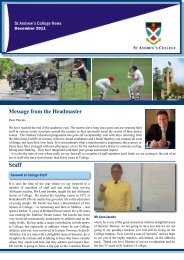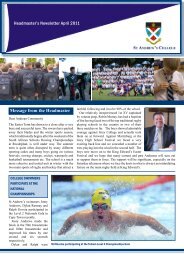ISASA Statement on Bullying - A Family of Schools
ISASA Statement on Bullying - A Family of Schools
ISASA Statement on Bullying - A Family of Schools
Create successful ePaper yourself
Turn your PDF publications into a flip-book with our unique Google optimized e-Paper software.
<str<strong>on</strong>g>ISASA</str<strong>on</strong>g> <str<strong>on</strong>g>Statement</str<strong>on</strong>g> <strong>on</strong> <strong>Bullying</strong><br />
The Independent <strong>Schools</strong> Associati<strong>on</strong> <strong>of</strong> Southern Africa (<str<strong>on</strong>g>ISASA</str<strong>on</strong>g>) would like to place <strong>on</strong><br />
record that both the Associati<strong>on</strong> and its member schools c<strong>on</strong>demn bullying in any form. The<br />
recent media coverage <strong>of</strong> alleged bullying in independent and public schools has prompted it<br />
to issue a public statement to this effect.<br />
<strong>Bullying</strong> <strong>of</strong> any nature in public and independent schools is prohibited in the <strong>Schools</strong> Act<br />
(1996) and its subsequent amendments, and is a breach <strong>of</strong> learners’ c<strong>on</strong>stituti<strong>on</strong>al rights.<br />
Adults, and in particular parents and teachers, have a resp<strong>on</strong>sibility to report bullying if and<br />
when they become aware <strong>of</strong> it, not to c<strong>on</strong>d<strong>on</strong>e it through silence. Children, like all people,<br />
are equal before the law and must be protected. <strong>Bullying</strong> is a criminal <strong>of</strong>fence and can result<br />
in prosecuti<strong>on</strong> <strong>of</strong> the perpetrators.<br />
It also c<strong>on</strong>travenes <str<strong>on</strong>g>ISASA</str<strong>on</strong>g>’s Requirement for Membership: an <str<strong>on</strong>g>ISASA</str<strong>on</strong>g> member school must<br />
“promote and nurture a commitment to a society based <strong>on</strong> democratic values, social justice<br />
and fundamental human rights”.<br />
Moreover in its Code <strong>of</strong> Ethical Practice <str<strong>on</strong>g>ISASA</str<strong>on</strong>g> exhorts its members to.<br />
B.1.1. act h<strong>on</strong>estly and fairly, with due respect for the rights <strong>of</strong> staff, learners,<br />
parents and members <strong>of</strong> the governing body; …<br />
B.1.4. exhibit moral leadership, and as such, promote the adopti<strong>on</strong> and practice <strong>of</strong> a<br />
sound value system in the school;<br />
B.1.5 encourage a learner-centred philosophy in order to develop<br />
• each child to her/his full potential academically, emoti<strong>on</strong>ally,<br />
physically and spiritually,<br />
• a community <strong>of</strong> learners who are self-disciplined and have a sound<br />
work ethic, and<br />
• a code <strong>of</strong> c<strong>on</strong>duct based <strong>on</strong> courtesy, mutual respect and<br />
acknowledgement <strong>of</strong> the rights <strong>of</strong> all groups in the school community.<br />
Any incidence <strong>of</strong> bullying is deplorable because it has such serious and far-reaching<br />
c<strong>on</strong>sequences for the victim, the aggressor, the families involved and the school.<br />
<strong>Bullying</strong> in schools<br />
Unfortunately, despite school leaders’ efforts to stop bullying, in all public and independent<br />
schools it can still occur, <strong>of</strong>ten beneath the radar screen. <strong>Bullying</strong> is a vexed problem for two<br />
main reas<strong>on</strong>s:<br />
• Young children who are victims <strong>of</strong> bullying tend not to bring these incidents to the<br />
attenti<strong>on</strong> <strong>of</strong> their parents and teachers for a number <strong>of</strong> reas<strong>on</strong>s relating to poor self-<br />
1
esteem and the desire for acceptance by the peer group. As a result, bullying is <strong>of</strong>ten<br />
<strong>on</strong>ly detected after it has been going <strong>on</strong> for a l<strong>on</strong>g time and has reached a very serious<br />
level;<br />
• In dealing with incidents <strong>of</strong> bullying, the first priority is the protecti<strong>on</strong> <strong>of</strong> the victim. This<br />
can significantly complicate disciplinary procedures and so the process <strong>of</strong>ten takes much<br />
l<strong>on</strong>ger to thoroughly investigate and c<strong>on</strong>clude.<br />
Anti-bullying acti<strong>on</strong> in <str<strong>on</strong>g>ISASA</str<strong>on</strong>g> schools<br />
There is probably no issue that has exercised the minds <strong>of</strong> the <str<strong>on</strong>g>ISASA</str<strong>on</strong>g> community <strong>of</strong> schools<br />
more than bullying for many years. This is reflected in sessi<strong>on</strong>s devoted to it at our main<br />
c<strong>on</strong>ferences and articles in our publicati<strong>on</strong>, Independent Educati<strong>on</strong>. <strong>Schools</strong> have<br />
researched, discussed and initiated anti-bullying policies and programmes and <str<strong>on</strong>g>ISASA</str<strong>on</strong>g> has<br />
taken steps to both promote awareness <strong>of</strong> bullying in all its insidious forms and how to<br />
eradicate it. In the last two years, two prominent American educati<strong>on</strong>ists, Michael Thomps<strong>on</strong><br />
and Rachel Simm<strong>on</strong>s, have been brought to South Africa by <str<strong>on</strong>g>ISASA</str<strong>on</strong>g> to c<strong>on</strong>duct workshops<br />
and lectures <strong>on</strong> educating boys and girls respectively, with specific reference to bullying<br />
am<strong>on</strong>g other topics.<br />
In the end, the <strong>on</strong>ly way that bullying can be effectively eradicated is by creating an enabling<br />
envir<strong>on</strong>ment in the school community that makes it possible for victims to come forward<br />
without fear <strong>of</strong> reprisal and by taking appropriate disciplinary acti<strong>on</strong> against those found<br />
guilty <strong>of</strong> bullying. <str<strong>on</strong>g>ISASA</str<strong>on</strong>g> encourages its schools to strive towards establishing this type <strong>of</strong><br />
school culture and, indeed, many <strong>of</strong> our schools have had much success in their<br />
endeavours.<br />
<str<strong>on</strong>g>ISASA</str<strong>on</strong>g> has also made a number <strong>of</strong> resources <strong>on</strong> bullying available to its members <strong>on</strong> its<br />
website. They include:<br />
• A pro-forma anti-bullying policy for schools<br />
• Articles <strong>on</strong> internati<strong>on</strong>al research <strong>on</strong> bullying<br />
Recourse for parents<br />
It is important to note that not all independent schools are members <strong>of</strong> <str<strong>on</strong>g>ISASA</str<strong>on</strong>g>. <str<strong>on</strong>g>ISASA</str<strong>on</strong>g> is not<br />
an educati<strong>on</strong> department that owns and c<strong>on</strong>trols its schools, but a membership-based<br />
service organisati<strong>on</strong> providing pr<strong>of</strong>essi<strong>on</strong>al services to its member schools. <strong>Schools</strong> are<br />
independent, and enjoy the status <strong>of</strong> a private organisati<strong>on</strong>, and therefore <str<strong>on</strong>g>ISASA</str<strong>on</strong>g> cannot<br />
interfere in their internal affairs.<br />
N<strong>on</strong>etheless there are procedures in <str<strong>on</strong>g>ISASA</str<strong>on</strong>g> for investigating serious allegati<strong>on</strong>s that might<br />
affect the school’s membership in terms <strong>of</strong> <str<strong>on</strong>g>ISASA</str<strong>on</strong>g>’s requirements.<br />
<str<strong>on</strong>g>ISASA</str<strong>on</strong>g> cannot take up an individual parent’s cause and will <strong>on</strong>ly c<strong>on</strong>sider the matter if it<br />
receives written, substantially supported allegati<strong>on</strong>s <strong>of</strong> practices that are in c<strong>on</strong>flict with the<br />
standards <strong>of</strong> the Associati<strong>on</strong>, and then <strong>on</strong>ly as a basis for further inquiry.<br />
In such circumstances <str<strong>on</strong>g>ISASA</str<strong>on</strong>g> requests its relevant Regi<strong>on</strong>al Director to c<strong>on</strong>duct a<br />
c<strong>on</strong>fidential inquiry with the knowledge <strong>of</strong>, and in c<strong>on</strong>ference with those c<strong>on</strong>cerned.<br />
Depending <strong>on</strong> the outcome, <str<strong>on</strong>g>ISASA</str<strong>on</strong>g> will activate its internal disciplinary process that can<br />
result in either suspensi<strong>on</strong> or terminati<strong>on</strong> <strong>of</strong> membership.<br />
2
The advice <str<strong>on</strong>g>ISASA</str<strong>on</strong>g> gives to parents is as follows:<br />
If the school has a formal complaints procedure, the parents should begin by using these<br />
proper channels.<br />
If parents are not satisfied with the way a school's management has dealt with the matter,<br />
they can refer a written complaint to the chairpers<strong>on</strong> <strong>of</strong> the school’s governing body.<br />
If parents still feel that the school’s resp<strong>on</strong>se is unsatisfactory, then parents have recourse to<br />
external avenues:<br />
• Parents can seek legal advice and acti<strong>on</strong> <strong>on</strong> the matter.<br />
• Independent schools have to be registered with their provincial educati<strong>on</strong> department.<br />
If parents believe that complaint is <strong>of</strong> such a serious nature that the school should be<br />
investigated by the educati<strong>on</strong> department, they should send a written complaint to the<br />
department.<br />
• Parents can lodge a complaint with the Human Rights Commissi<strong>on</strong>.<br />
Where the child is deeply unhappy in a particular school for whatever reas<strong>on</strong>, parents should<br />
c<strong>on</strong>sider removing the child from that school and finding another suitable <strong>on</strong>e.<br />
22 July 2009<br />
3




